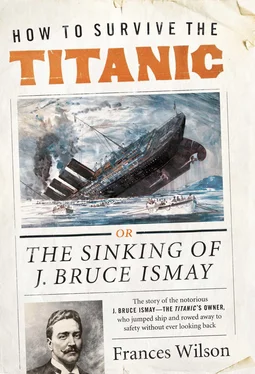The Captain pulls the man, whose name is Leggatt, on board. Like Jim, Leggatt is the son of an English country parson. He has swum several miles from his own ship, the Sephora, where, during a storm, he landed a blow on the head of a mutinous seaman. The seaman is killed, and Leggatt kept prisoner in his cabin. After nine weeks of incarceration, he is overcome by ‘a sudden temptation’ and jumps: ‘I was in the water before I had made up my mind fairly’, and he swims until he sees the lights of this present ship, when he decides to chance his luck. Leggatt feels blameless: in killing the man he saved his ship, and he has nothing but disdain for the law by which he will be judged should he ever again see land. ‘But you don’t see me coming back to explain such things to an old fellow in a wig and twelve respectable tradesmen, do you? What can they know whether I am guilty or not — or of what I am guilty, either?’ The Captain feels sympathy for the fugitive, who is older than him by five years and trained, as he did (and as Captain Rostron did too), on the HMS Conway in Liverpool (a training ship which was also a concern of Thomas and Bruce Ismay). He gives Leggatt a sleeping suit of the ‘same grey-striped pattern as the one I was wearing’ and, at the risk of losing his own authority with the crew, keeps him hidden in his cabin. ‘He appealed to me as if our experiences had been as identical as our clothes… I saw it all going on as though I were myself inside that other sleeping suit…’ Leggatt is the Captain’s ‘double’, his ‘reflection in a dark and sombre mirror’. Conrad forces on the reader the fact of the Captain’s identification, using the word ‘double’ on nineteen occasions. ‘I knew well enough… that my double there was no homicidal ruffian. I did not think of asking him for details, and he told me the story roughly in brusque, disconnected sentences. I needed no more.’ If anyone were to see the pair of them, ‘he would think he was seeing double, or imagine himself come upon a scene of weird witchcraft; the strange captain having a quiet confabulation by the wheel with his own grey ghost’. Not that the two men looked in any way similar. ‘He was not a bit like me, really; yet, as we stood leaning over my bed place, whispering side by side, with our dark heads together and our backs to the door, anybody bold enough to open it stealthily would have been treated to the uncanny sight of a double captain busy talking in whispers with his other self.’ Leggatt too has found his sharer: ‘As long as I know that you understand,’ he whispers. ‘But of course you do. It’s a great satisfaction to have got somebody to understand. You seem to have been there on purpose… It’s very wonderful.’
The Captain’s description of himself with his looking-glass reflection recalls the picture Conrad painted of himself and Marlow, ‘when, in silence, we lay our heads together in great comfort and harmony’. But the company of Leggatt does not offer comfort and harmony: the Captain is ‘creeping quietly as near insanity as any man who has not actually gone over the border’. In the story’s thrilling final scene the Captain takes a risk with his ship and ‘shaves the land as close as possible’ to allow Leggatt to leg it and swim to the island of Koh-ring. ‘The secret sharer of my cabin and of my thoughts, as though he were my second self, had lowered himself into the water to take his punishment: a free man, a proud swimmer striking out for his new destiny.’
‘The Secret Sharer’ belongs to the same world as Lord Jim: there is a crime at sea, a jump, a story to unburden, an understanding captain, and a second chance. Both Jim and Leggatt commit a ‘breach of faith with the community of mankind’, and both men make sense to themselves only in relation to another. ‘We exist,’ as Conrad puts in, ‘only in so far as we hang together.’ And like Lord Jim, ‘The Secret Sharer’ is based on a real event. In September 1880, during an argument on board the Cutty Sark, the chief mate, Sydney Smith, brought a capstan bar down on the head of a black seaman, who died from injuries three days later. Sydney Smith persuaded the Captain to let him jump overboard where he swam until he was smuggled onto another ship. In his shame, the Captain of the Cutty Sark then killed himself. In Conrad’s hands, the scandal, which was reported in every paper and discussed in every port, becomes the tale of two men in their sleep suits whispering in a ship’s cabin, and this dreamlike scene recalls Ismay in his pyjamas, hiding in the doctor’s cabin on the Carpathia, plotting with Lightoller how to escape the inquiry without anyone noticing. Lightoller, like Conrad’s captain, is caught between personal conscience and corporate duty. Will the officer prove ‘faithful to that ideal conception of one’s own personality every man sets up for himself secretly’?
Lightoller (who shares his own secrets with his wife, whom he met on board a White Star ship) is not Ismay’s only secret sharer. Wherever we find him, Ismay is one half of a whispering partnership. He whispers side by side with Harold Sanderson, his secret replacement at the IMM; he whispers over dinner with Lord Pirrie when they plan to upstage the Lusitania with the Titanic; he whispers with William E. Carter, who jumped into his lifeboat at the same time; with Captain Smith, who handed him the Marconigram from the Baltic; with J. P Morgan, whose involvement in the finances of the White Star Line would come as a shock to the British inquiry; and most importantly he whispers with Mrs Thayer. He is mired, Ismay reveals to her, in the moment of his jump; he is lost and can only find himself again in her. Ismay and Marian Thayer form, he feels, a part of one another. It seems that everyone, except Florence, is Ismay’s secret sharer. 13
To Ismay’s family it was Kipling and not Conrad who best described his internal struggle, and Bruce’s sister-in-law sent him a copy of Kipling’s ‘If’ because ‘it reminds me so of you’. First published two years earlier in the collection Rewards and Fairies, Kipling had written the verse in 1895 in celebration of Dr Leander Starr Jameson, a British colonial statesman who, with the secret support of the British government, had assembled a private army outside the Transvaal to overthrow Paul Kruger’s Boer government. The uprising, known as the Jameson Raid, was prevented by the Boer forces and Jameson was forced to surrender. His much-publicised trial took place in London where he was lionised by the press as ‘the hero of one of the most daring raids in all the annals of border warfare’. Jameson held his tongue throughout about the involvement of the government under whose auspices he was now being tried, and presented himself in court as ‘a quiet, modest gentleman, in faultless and fashionable dress, with civilian stamped upon him from head to foot’.
If you can keep your head when all about you
Are losing theirs and blaming it on you,
If you can trust yourself when all men doubt you,
But make allowance for their doubting too;
If you can wait and not be tired by waiting,
Or being lied about, don’t deal in lies,
Or being hated, don’t give way to hating,
And yet don’t look too good, nor talk too wise:
If you can dream — and not make dreams your master;
If you can think — and not make thoughts your aim;
If you can meet with Triumph and Disaster
And treat those two impostors just the same;
If you can bear to hear the truth you’ve spoken
Twisted by knaves to make a trap for fools,
Or watch the things you gave your life to, broken,
And stoop and build ‘em up with worn-out tools—
If you can do these things and more, Kipling concludes, ‘you’ll be a Man, my son’. To his family, Ismay was shouldering the blame with the stoicism of a soldier.
Читать дальше












